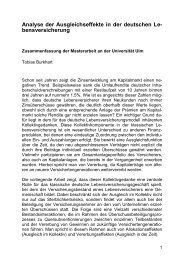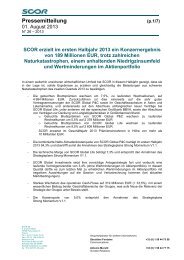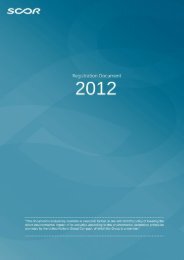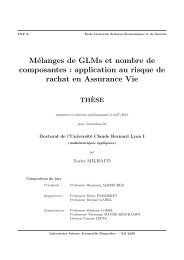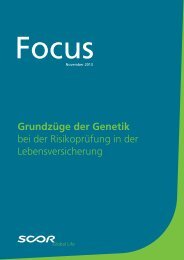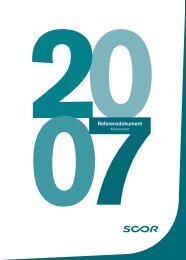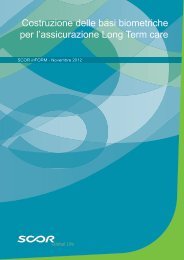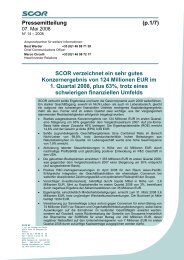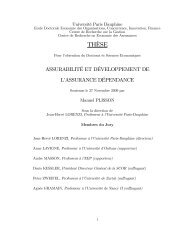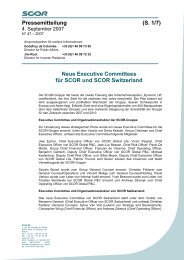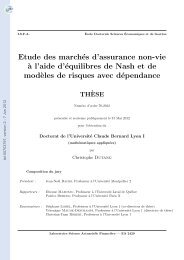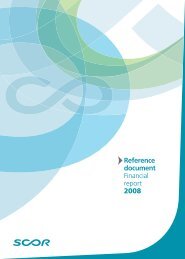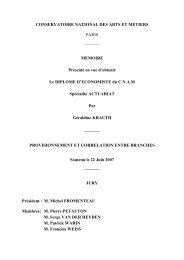Annual Report - Scor
Annual Report - Scor
Annual Report - Scor
Create successful ePaper yourself
Turn your PDF publications into a flip-book with our unique Google optimized e-Paper software.
<strong>Annual</strong> <strong>Report</strong> SCOR 2009<br />
january february march april may june july august september october november december<br />
In London, prizes were awarded to Radhika Sen, from Heriot Watt<br />
University, for her dissertation entitled “An Extension of the Lee-<br />
Carter Model to Project Mortality by Incorporating the Cohort<br />
Effect” and to Faisal Baluch, from City University, for his study<br />
entitled ”Systemic Risk: Financial Institutional Symmetry or Meso<br />
Idiosyncrasy? A comparison of the Banking & Insurance Sectors”.<br />
In Munich, Gregor Svindland of Ludwig-Maximilian University in<br />
20<br />
Do reinsurers automatically cover<br />
the risk of a pandemic?<br />
A pandemic would have a significant impact on practically<br />
all life and accident contracts (health, disability, death), with<br />
a different impact for reinsurers depending on the nature of<br />
the cover reinsured and the exposure of the reinsurer. Only<br />
those insurance contracts that cover accidental death and<br />
disability would remain unexposed, along with excess of loss<br />
catastrophe treaties, which are based on the notion of an<br />
accidental event. However, treaties covering death and<br />
longevity would certainly be affected by a pandemic.<br />
Is this a risk reinsurers should<br />
regularly cover for their cedants?<br />
All health and mortality policies are usually exposed to the<br />
risk of a pandemic. It would be very difficult, and maybe<br />
impossible, to exclude this risk from our reinsurance cover:<br />
■ In order to exclude the risk, the pandemic would have to<br />
be defined in detail so that the resulting claims could be<br />
eliminated case by case. The confusion between the H1N1<br />
virus and seasonal flu sufficiently underlines the difficulty<br />
involved in this.<br />
Munich received an award for his thesis entitled “Convex Risk Measures<br />
Beyond Bounded Risks”, as did Anja Blatter of the University of Karlsruhe<br />
for her dissertation entitled “Optimal Control and Dependence<br />
Modelling of Insurance Portfolios with Lévy Dynamics”. Stefan Pohl, of<br />
the University of Cologne, received an award for his work entitled<br />
“Cancelling at the principal expiry date in Motor Insurance - Discretetime<br />
analysis of the risk rate with left-truncated data”.<br />
INSIDE WORD<br />
Pandemics:<br />
from the protection of cedants<br />
to the protection of reinsurers<br />
By Emmanuel Durousseau<br />
■ Attempts have been made to reduce or exclude this risk<br />
from stop loss treaties when the epidemic reaches stage 6<br />
in terms of seriousness, as defined by the WHO, or to<br />
reduce cover in the event of such a stage 6 being declared<br />
by the WHO.<br />
Isn’t it very expensive for a reinsurer<br />
to protect itself against all the heightened<br />
sanitary risks involved?<br />
Of course, contractual safety measures exist within traditional<br />
retrocession, offering similar solutions to those provided by<br />
reinsurers. Such measures include stop loss with a specific<br />
trigger in the event of a pandemic, as well as specific nonproportional<br />
excess of loss catastrophe treaties to cover the<br />
risk of a pandemic. The most up to date solutions are those<br />
adopted by SCOR through swaps and a mortality bond based<br />
on the deviation of a general mortality indicator. Necessary<br />
due to SCOR’s high level of involvement in Life and accident<br />
reinsurance, which makes the risk of a pandemic one of the<br />
peak risks in our ERM analysis, these solutions are efficient,<br />
but still very costly.



